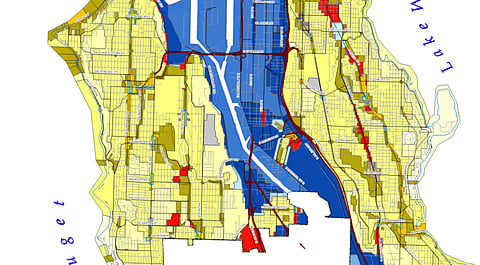OPINION: So-Called Affordable Housing is Still Out of Reach for Many Seattleites
by Tyler Adamson
Considering the Seattle City Council's recent conversations on zoning laws, it's particularly pertinent to dig a little deeper into the topic, especially as it applies to accessibility and the racist and segregatory intent which these laws were originally designed. However, the notion that zoning laws are at the root cause of our disparate housing system is simply short-sighted.
What often gets left out of the dialogue around this topic is that while availability of housing — be it apartments or paired housing (e.g. duplexes or triplexes) — is crucial for dismantling historically racist housing practices, "affordable housing" is a privilege only some can access because most of these new developments still remain out of reach for many low-income families. A Seattle Times article noted that in early 2018, rent prices dropped for the first time in a decade, yet a quick peak at Zillow estimates the average median rent price of a 1-bedroom remaining around $1,940. Even a crude calculation using the "one-third" rule — that you should only pay one-third of your monthly income on rent — would require a family to make an annual salary of at least $60,000, or $30 per hour, to comfortably afford the average 1-bedroom apartment in the Seattle.
Thanks to the $15 minimum wage legislation passed in 2014, those working for employers with 500 or more employees could theoretically make an estimated $30,000 annually; but for anyone working for smaller employers must wait until either 2019 or 2021 for that same wage increase. For a family of six, that's still below the federal poverty line, well below the Area Median Income of $93,100, and barely half of what would be needed to afford the average 1-bedroom apartment in Seattle.
Even for units that are considered "low-income" by developers, prices still start at $600 for only a studio, but many have wait-lists of six months or more. For families larger than two people or elderly on social security, that could be more than half of their monthly income — where will the rest of the money they need come from? And let's not even get started on the wait list for housing vouchers — it's years long.
That said, availability rarely translates to affordability, especially at the scale which is now demanded of us as Seattleites, neighbors, and above all, human beings. Which is why I respectfully reject the notion that zoning laws are to blame and that changing them will dissolve us of the housing crisis. Do they reinforce existing racist and discriminatory infrastructure? Absolutely. But unless we can have a renewed dedication to building publicly funded affordable housing from our elected officials, I believe the only ones who would benefit from reexamining zoning laws would be those who could afford the new units, and unfortunately those are not the families who need them most. What's also [conveniently] left out of this conversation is the role of major companies in the current housing crisis
At first glance, the $500 million Microsoft recently donated towards housing affordability seems like a great step-forward until one realizes that 95 percent of that money is going to loans that the company will profit from, not as philanthropic as we once thought, but commendable, nonetheless. Furthermore, there are major corporations that have yet to pay their fair share (cough, looking at you Amazon, cough) and actively fight any initiative that would disproportionately affect them while continuing to reap the benefits of tax breaks and incentives. A recent article in the New York Times by E. Tammy Kim proposed a policy that echoed the Seattle head tax, and called unaffordable rents for what they truly are, "not a personal failing or inevitable outcome of the market; they are a corporate externality as toxic as smog or acid rain."
Let's talk zoning laws after we demand some action by our business leaders, elected city and county officials on behalf of vulnerable Seattle/King County residents, and, above all, the children who have the most to lose in all of this. This situation isn't getting better anytime time soon, so we must make those who've gained the most from this Seattle boom pay their fair share and use the land we already have to serve the ones who need it most, consciously and affordably; instead of hoping that developers and big companies have the health and well-being of some of our cities most vulnerable residents in mind.
Housing is a human right, and we should treat it as such, giving it lip service isn't enough anymore. Seattle is known for being a leader on many fronts, and with no one other major city having an adequate amount public affordable housing, now is the time to step-up and be the leaders we know we are; if our elected officials refuse- vote them out.
Love the Emerald? Be a Rainmaker! Rainmakers are recurring donors that ensure our quality South Seattle coverage. Follow this link to be part of the Rainmaker family.
📸 Featured Image: City of Seattle Zoning Map.
Help keep BIPOC-led, community-powered journalism free — become a Rainmaker today.


